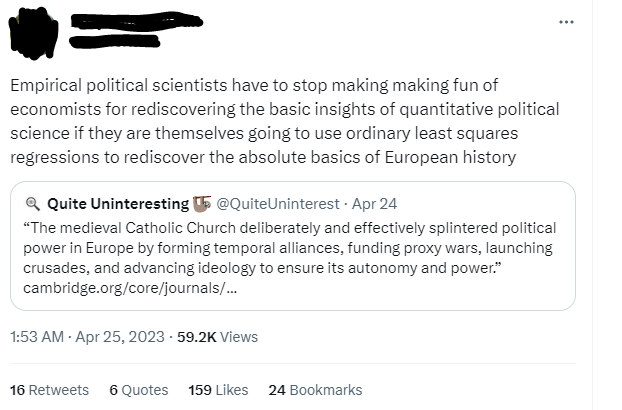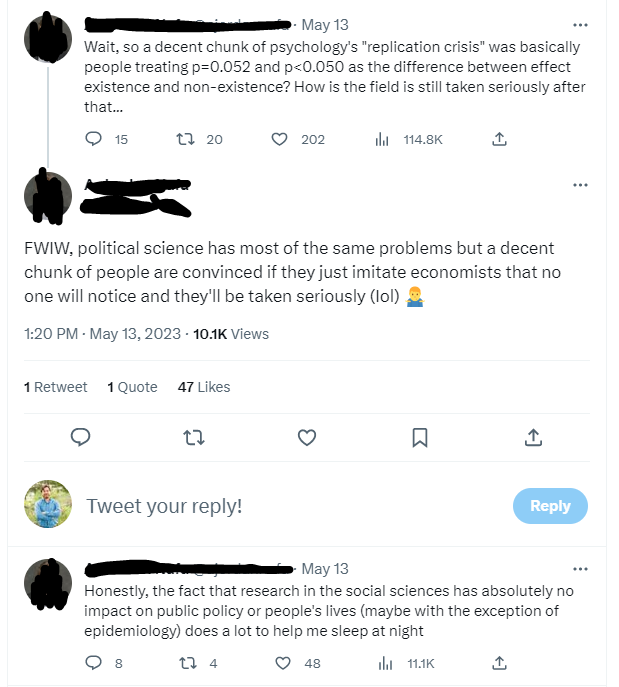UPDATE: As a commenter helpfully pointed out, the person whose tweet I’m responding to was a political science Professor, not a historian. This kind of messes with the framing of this post but rather than stealth re-write it I’ll leave it as is and let you interpret my Freudian slip as you like
When I was in grad school, my Department’s grad student organization made shirts that read, “Political Science: Four sub-fields, no discipline.” Behind this joke is a common observation about political science, that it is defined by its focus rather than a formal set of methods or theories. Not everyone agrees with this characterization, and there have been some efforts to craft political science-specific tools. But generally political science is a field that draws on insights and tools from other areas to study politics. This is most pronounced in international relations. IR looks not just to other fields but also other sub-fields of political science to study the world.
Many present IR’s lack of discipline as a critique. They view IR scholars as a group of raiders, pillaging ideas and methods from other disciplines then returning to our barren homeland. Two recent Twitter kerfuffles, however, demonstrate that this aspect of IR is actually our greatest strength.
Erecting ramparts against the IR hordes
I don’t spend much time on Twitter anymore, but I still seem to discover the latest controversy. Two academic ones were related in their attacks on political science.
First, a historian responded angrily to a new article in the American Political Science Review by Anna Grzymala-Busse on European state formation. The historian suggested she used overly-simplistic methods to make a point that “real” experts on early modern Europe already knew (I’ve anonymized the tweet as I don’t like engaging in Twitter attacks).

This is a common complaint I’ve heard from historians studying international issues. IR and CP either take history’s insights and repackage them as our own, or don’t realize historians have already said this. Several academic institutions I’ve been a part of have included fierce and rather petty attacks by historians on political scientists.
As some respondents to this tweet noted, however, this historian isn’t really being fair. The role of religion in state formation is hardly settled ground–I took an entire class on debates over the role of religion in nationalism in grad school. Also, isn’t it a good thing to test and confirm certain arguments using a different set of data and methods? And when pressed, he couldn’t point to what historical works the author overlooked.
Critiques of IR and political science take the place of addressing real issues within other areas of study
In a follow-up tweet, the historian also makes an ironic call for interdisciplinarity. Ironic because this is an interdisciplinary work! Grzymala-Busse combined insights from comparative politics and history to generate new knowledge; this is in line with her other work, which involves careful attention to historical detail. Those calling for interdisciplinary engagement should cheer this, unless “interdisciplinary” just means listening to historians…
The second Twitter incident involved a data scientist. A data science grad student tweeted a broadside against the replication crisis in psychology, followed by attacks on political science and the social sciences in general. Another data scientist responded by pointing out that social scientists don’t conduct our own statistical analysis and instead get “real statisticians” to do it.

Again, people took issue with this. Some noted the data science grad student hadn’t really characterized the replication crisis accurately. Others asked for specific examples (which weren’t forthcoming). I’d also point out that it is true data science does have a real impact on our lives, but it’s hardly a positive one; one data science course I took focused on things like getting around CAPTCHA tests and tricking spam filters. And in practice “interdisciplinary” for data science often means using Python to study political or social issues without engaging actual subject matter experts.
These are very different controversies, and I’m sure these two people wouldn’t agree on much if forced to have a conversation. But both involve the perennial attack on political science (and IR by extension): we don’t come up with our own insights or methods, we just steal the former and implement the latter badly.
What’s going to happen to us without barbarians?
I thought of this debate recently while visiting the excellent Jorvik Viking Centre in York, England. The popular view of the Norse raiders known as vikings is of pillaging hordes, and that was certainly the case initially. But as often happens, they settled down. And in the case of Jorvik, they created a thriving cosmopolitan society enabled through their wide-ranging travels.
Maybe I’m pushing this metaphor a bit here, but I think of IR as Jorvik.
Yes, we got our start by combining economic models and humanistic insights. Yes, our research tends to include references from disparate traditions. Yes, our data is messier than other fields or even sub-fields within political science.
These issues all became strengths, however.
Because of IR’s broad roots we have to be conversant in different disciplines. When engaging with people from other disciplines, I often get the sense they’ve never really read anything from my field; their critiques are often caricatures. By contrast, many IR scholars are well-read in other fields.
Additionally, we recognize the difficulty of drawing on and testing different disciplines. That’s why you can find IR and political science discussions about combining methodologies or triangulating among competing schools of historiography.
Finally, the challenge of dealing with incredibly messy data has created problems for IR but also led to fertile debates. For example, the problem of selection effects in conflict onset has led to a useful back-and-forth.
Interdisciplinary means each side listens to and learns from the other, not that one asserts superiority and territoriality
Beyond that, these critiques of political science and IR take the place of addressing real issues within other areas of study. In C.P. Cavafy’s poem, “Waiting for the Barbarians” (which I referenced above) the inhabitants of a classical city sit and wait for the barbarians to arrive instead of dealing with the problems in their civilization. We can sense this in some of the attacks I’m discussing.
Historians are rightly frustrated at the lack of support for and interest in the humanities from universities and the general public. They often, however, see political science as the problem, such as Grzymala-Busse making a splash by engaging in historical debates. I am also reminded of a seminar my grad school put on to help students prepare and turn their dissertations into books; we went around the room discussing our topics and one history student made a crack about how “relevant” mine would be in DC. Rather than finding ways to demonstrate the value of a humanistic and historical approach to contemporary issues, some historians seem to blame political science and IR for sucking up all the attention (and student interest).
Likewise, data scientists are rightly tired of inadequate statistical models and badly interpreted findings. But what many of them seem to miss is that this is not a problem of stupidity: it is over-confidence, something data science tends to exhibit. I also sense a bit of frustration that political scientists are still seen as the expert on…politics despite our lack of cutting edge programming skills. This could be solved by closer collaborations between data scientists and subject matter experts, something that is often lacking.
It’s almost like political science and IR have become the Other to our critics, alleviating the need for any deeper reflection. As Kavafy ended his poem: “those people were a kind of solution.”
Interdisciplinary goes both ways
So what should be done?
Well, I am just finishing a fellowship at Edinburgh University’s Institute for Advanced Studies in the Humanities (IASH), which was funded by the Centre for the Study of Islam in the Contemporary World. It includes fellows from across the humanities, as well as the social and natural sciences. Part of the fellowship is a “work in progress” talk, which I gave last week. The empirical subject was my new work using social network analysis to study international religious politics, but the broader theme was my ongoing effort to test concepts from the humanities using quantitative social science methods.
I was unsure about the reaction. I didn’t know if the crowd of humanities scholars would react hostilely to me as an interloper. Instead, it was an incredibly fruitful discussion. There were tough questions and critiques, but they were in the spirit of collaboration and community. They recognized that I valued their disciplines, and they did not see the fact that I drew on theirs and mixed it with others (i.e., my lack of discipline) as a problem.
In this context, interdisciplinary meant each side listened to and learned from the other, rather than one asserting superiority and territoriality. It’d be nice if that attitude spread outside IASH.


Very interesting post, with good points, but the professor whose handle is blacked out in the first tweer appears to be Poli Sci not history.
(But maybe I’m misreading something.)
I have to admit I don’t understand the first quoted tweet. “Empirical political scientists …” So would appreciate enlightenment.
But the continuation is clearer:
“This is such an object lesson in the importance of interdisciplinarity. The first sentence of this article published in the most prestigious journal in political science is “The medieval church was a powerful, if neglected, force in European state formation.” NEGLECTED BY WHOM??”